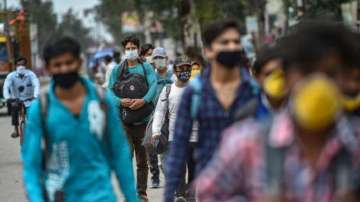With the country gearing for gradual relaxations in the COVID-19 lockdown norms from June 8, the Goa Health Ministry has compiled a comprehensive list of dos and dont's, which spell out precautions that need to be taken in various aspects of life, including in public places, dealing with house-help or using public transport.
The handbook which has been prepared by the Goa Institute of Public Administration and Rural Development and the Department of Preventive and Social Medicine of the state's top medical facility, the Goa Medical College, also contains a set of precautionary guidelines for housing societies, educational institutions and government offices.
The handbook advises, that domestic help should use hand sanitisers before entering and leaving homes.
"If any refreshments or meals are to be served to them, the same may be given in a tiffin or appropriate container, to consume it at their home," the handbook states.
"Watchmen and security guards may be instructed not to touch ID cards, letters, licenses, etc., while allowing people to enter the housing compounds; without wearing gloves," the guidelines says.
Advising banks to relocate their cheque drop boxes outside the bank's interiors, the handbook also instructs tellers to "sanitise their hands frequently and preferably after every transaction".
"Guards manning the ATMs should be provided with sanitisers and they should ask every customer to sanitise their hands every time they enter to make a transaction," the handbook specifies, adding that thermal guns should be used to check temperatures of employees and visitors in every workspace, run by both private and government agencies.
In its guidelines related to precautions to be taken while using public transport, the handbook states that "vehicles should be sanitised or disinfected preferably after each trip, and certainly at the end of the day", adding that drivers and conductors should always wear masks and compel passengers to wear masks too.
"Drivers, helper, conductors should wash their hands or take bath and wash their clothes at the end of the day and maintain proper hygiene," the handbook states.
While urging private and government office heads to ensure the standard precautionary measures like availability of hand sanitiser, maintaining social distancing and ensuring basic hygiene, the handbook also states, that every office should create a task force or a vigilance team to supervise social distancing, cleanliness, while urging employers to arrange periodical psychological counselling for employees.
"Every office should formulate a Resilience Plan, with details of helpline numbers, nearest hospitals, deep cleaning and sanitation schedules, proper seating arrangements and facilities to attend to the visiting public or clients," the handbook advises.
Latest India News
